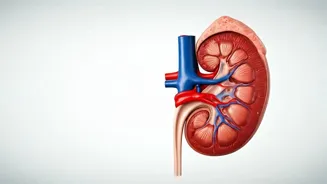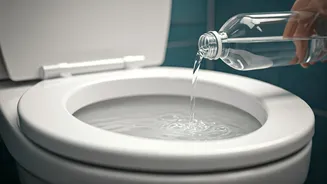Hydration & Dehydration
Adequate water intake is pivotal for kidney function. Dehydration can significantly impair the kidneys' ability to flush out waste products and toxins
from the body. Chronic dehydration can lead to kidney stone formation, and in severe cases, kidney failure. It's recommended to drink an adequate amount of water, which varies from person to person, but a good starting point is eight glasses a day. Listen to your body’s cues; if you are thirsty, your body is already mildly dehydrated. Include water-rich foods like fruits and vegetables in your diet to boost hydration levels and support optimal kidney function. Drinking enough water ensures that your kidneys have the fluids they need to function properly and maintain your overall health.
Medication Misuse
Over-the-counter (OTC) pain relievers, like ibuprofen and naproxen, are frequently used, but overusing them can be detrimental to kidney health. Prolonged or excessive use of these medications can reduce blood flow to the kidneys, potentially leading to kidney damage or even kidney failure. Always adhere to the recommended dosages and consult a healthcare professional, particularly if you need to take pain relievers regularly or have underlying health conditions. Be especially careful about taking multiple medications simultaneously without guidance. Your kidneys are delicate, and protecting them involves making conscious choices about the medication you consume, and under professional guidance when necessary.
Dietary Choices Impact
The food we consume has a direct impact on kidney health. A diet high in sodium, processed foods, and red meat can strain the kidneys. Excessive sodium intake can elevate blood pressure, which is a leading cause of kidney disease. Processed foods often contain high levels of sodium and phosphates, which can damage the kidneys. Moreover, a diet rich in animal protein can increase the kidneys' workload. To promote kidney health, focus on a diet rich in fresh fruits, vegetables, whole grains, and lean proteins. Limit your intake of processed foods, sugary drinks, and excessive sodium. Making informed dietary choices is a proactive step toward preserving kidney function and ensuring overall wellness, and eating habits will always directly correlate to health.
Managing Blood Pressure
High blood pressure, or hypertension, is a major risk factor for kidney disease. Elevated blood pressure can damage the blood vessels in the kidneys, impairing their ability to function correctly. Regular monitoring of your blood pressure is crucial, and so is controlling it through lifestyle changes and, if needed, medication. Exercise, a balanced diet, and reducing sodium intake are all lifestyle modifications that can help manage blood pressure. Work closely with a healthcare provider to monitor your blood pressure and adjust your medication, if prescribed. By keeping your blood pressure under control, you protect your kidneys from damage and reduce the risk of developing kidney disease.
Diabetes Control Matters
Diabetes is another significant risk factor for kidney disease. High blood sugar levels can damage the blood vessels in the kidneys, leading to diabetic nephropathy, a condition that can progress to kidney failure. If you have diabetes, managing your blood sugar levels is critical for protecting your kidneys. This involves regularly monitoring your blood sugar, taking prescribed medications, and following a balanced diet. Regular exercise can also improve insulin sensitivity and help manage blood sugar levels. Work in close collaboration with your doctor to create a diabetes management plan. Effective diabetes control is key to preserving kidney health and preventing diabetic nephropathy.
Regular Health Checkups
Routine checkups and screenings are vital for detecting kidney problems early. Kidney disease often has no early symptoms, which is why regular checkups can provide an early diagnosis. During a health checkup, your doctor will assess your kidney function through blood and urine tests. These tests can identify any signs of kidney damage or disease. If you have risk factors for kidney disease, such as diabetes, high blood pressure, or a family history of kidney problems, it's crucial to undergo regular screenings. Early detection allows for timely intervention and management, which can slow the progression of kidney disease. Don’t skip your appointments and stay on top of your checkups for a healthier life.



















